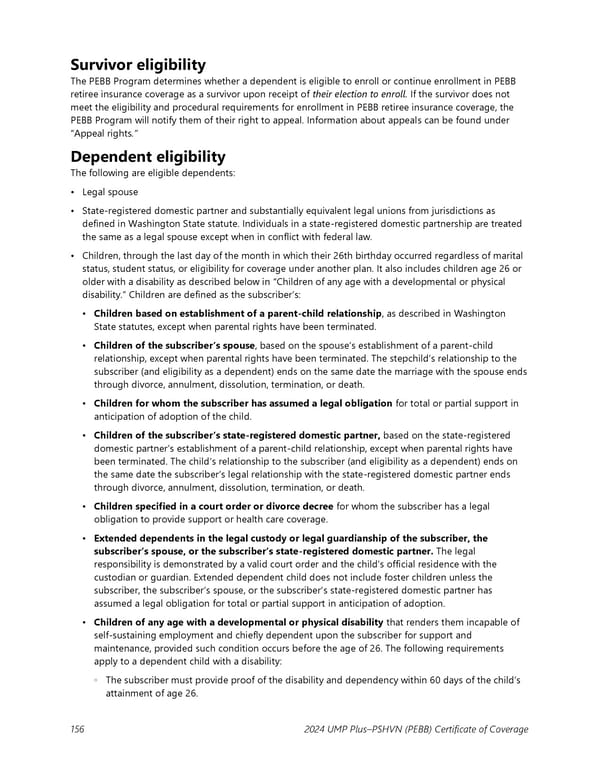Survivor eligibility The PEBB Program determines whether a dependent is eligible to enroll or continue enrollment in PEBB retiree insurance coverage as a survivor upon receipt of their election to enroll. If the survivor does not meet the eligibility and procedural requirements for enrollment in PEBB retiree insurance coverage, the PEBB Program will notify them of their right to appeal. Information about appeals can be found under “Appeal rights.” Dependent eligibility The following are eligible dependents: • Legal spouse • State-registered domestic partner and substantially equivalent legal unions from jurisdictions as defined in Washington State statute. Individuals in a state-registered domestic partnership are treated the same as a legal spouse except when in conflict with federal law. • Children, through the last day of the month in which their 26th birthday occurred regardless of marital status, student status, or eligibility for coverage under another plan. It also includes children age 26 or older with a disability as described below in “Children of any age with a developmental or physical disability.” Children are defined as the subscriber’s: ▪ Children based on establishment of a parent-child relationship, as described in Washington State statutes, except when parental rights have been terminated. ▪ Children of the subscriber’s spouse, based on the spouse’s establishment of a parent-child relationship, except when parental rights have been terminated. The stepchild’s relationship to the subscriber (and eligibility as a dependent) ends on the same date the marriage with the spouse ends through divorce, annulment, dissolution, termination, or death. ▪ Children for whom the subscriber has assumed a legal obligation for total or partial support in anticipation of adoption of the child. ▪ Children of the subscriber’s state-registered domestic partner, based on the state-registered domestic partner’s establishment of a parent-child relationship, except when parental rights have been terminated. The child’s relationship to the subscriber (and eligibility as a dependent) ends on the same date the subscriber’s legal relationship with the state-registered domestic partner ends through divorce, annulment, dissolution, termination, or death. ▪ Children specified in a court order or divorce decree for whom the subscriber has a legal obligation to provide support or health care coverage. ▪ Extended dependents in the legal custody or legal guardianship of the subscriber, the subscriber’s spouse, or the subscriber’s state-registered domestic partner. The legal responsibility is demonstrated by a valid court order and the child’s official residence with the custodian or guardian. Extended dependent child does not include foster children unless the subscriber, the subscriber’s spouse, or the subscriber’s state-registered domestic partner has assumed a legal obligation for total or partial support in anticipation of adoption. ▪ Children of any age with a developmental or physical disability that renders them incapable of self-sustaining employment and chiefly dependent upon the subscriber for support and maintenance, provided such condition occurs before the age of 26. The following requirements apply to a dependent child with a disability: ◦ The subscriber must provide proof of the disability and dependency within 60 days of the child’s attainment of age 26. 156 2024 UMP Plus–PSHVN (PEBB) Certificate of Coverage
 UMP Plus–Puget Sound High Value Network (PSHVN) COC (2024) Page 156 Page 158
UMP Plus–Puget Sound High Value Network (PSHVN) COC (2024) Page 156 Page 158